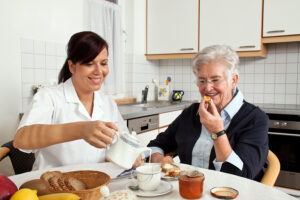Managing a Senior’s Loss of Appetite
Loss of appetite makes it difficult for elderly people to receive the nutrients they need to maintain their health. Lack of appetite can be the result of several issues, such as the negative effects of a medicine, physical discomfort, or emotional distress. Senior home care providers can help a senior navigate this appetite loss, and there may be certain things you can try to help a senior eat more.
Talk to Their Doctor First

Senior Home Care Midland Park NJ – Managing a Senior’s Loss of Appetite
Investigate potential triggers. Changes in a person’s physical health or personality often precede a loss of appetite. If a senior isn’t eating enough, it may be as easy as adjusting their dentures or getting them to do more physical activity during the day. A lack of appetite in the elderly may be a symptom of something serious, such as a digestive issue. A physical examination by a doctor may help rule out potential reasons, so it’s a good place to start. If your senior needs help to get to their doctor’s appointment, this is something you can ask for help from senior home care providers. If they cannot assist your senior, other professionals may help transport a senior.
Provide Light Snacks Throughout the Day
Smaller, more frequent snacks throughout the day may be preferable for seniors with poor appetites. When planning light snacks for seniors, it’s important to provide the same total daily caloric and nutritional intake that a senior would get from three full meals. In addition, having a friend or family member join the senior at mealtimes might help them eat more. Try having family dinner together with you and your loved one, or have a senior home care provider stay with your seniors during meal times to provide companionship. This may make eating more fun. Light snacks and chatting are great ways to distract your senior and get them to eat more.
Use Power Meal Throughout the Day
Include these superfoods in your elderly loved one’s diet, and you may be sure that they are getting the most nutrients possible from every meal. By sprinkling certain seeds, you may increase the amount of protein and omega fatty acids in foods like yogurt and oatmeal. Vegetable puree or protein powder can be added to fruit puree to ensure that seniors who love smoothies and shakes get the proper nutrients. In this manner, individuals may reduce their food intake while still getting the nutrients they need to refuel and maintain optimum physical performance.
Senior Home Care Aides Can Keep Track of What They Are Eating and What Works
Sometimes caregiving, even as a family member, means trying various things to get your senior to eat correctly. Keep track of what is working and stick with those things. If something doesn’t work, you shouldn’t keep doing it! Ask your senior if you’re not keeping track of what’s working. They know when they’re comfortable enough to eat and may even only like certain foods. Sometimes a senior will choose to eat certain foods and not other things, but you may not know it unless they tell you, so it’s important to have open communication with them.
If you or a senior family member are considering hiring Senior Home Care Services in Midland Park NJ, please contact the caring staff at Caring Solutions Home Care LLC. In-home senior care servicing Bergen & Passaic Counties. Call today at (973) 427-3553.
- Planning a Beach Trip With Your Elderly Loved One - March 24, 2025
- How Overnight Care At Home Helps Seniors - March 10, 2025
- What Lifestyle Changes Should Seniors Expect with High Blood Pressure? - February 19, 2025

